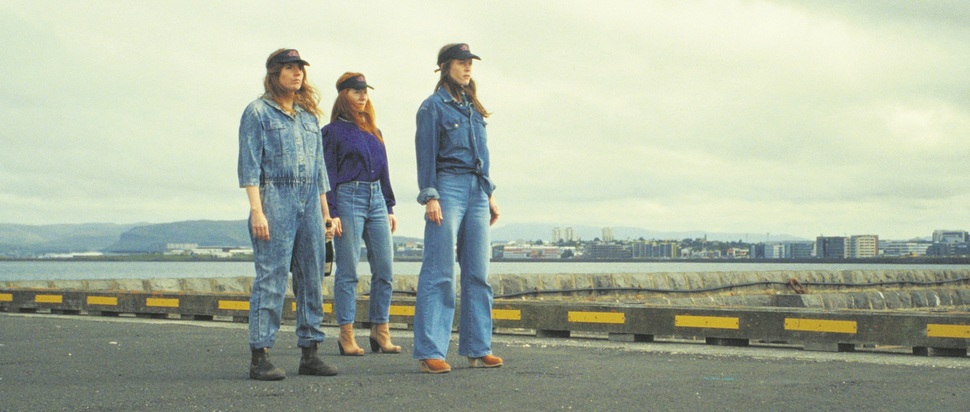Doc 'n' Roll: Álfrún Örnólfsdóttir on Band
Described as performance art meets Spinal Tap, Band follows a real-life Icelandic female punk collective during a creative crossroads. We speak to Álfrún Örnólfsdóttir, the director of Band and a member of the band, about blending fact and fiction
The three members of The Post Performance Blues Band are huddled around a laptop, talking to a potential manager about their time as a group. “The ball started rolling,” says Álfrún, the most forthright of the trio, “but it only rolled a little bit.” It’s a line that sums up their journey making performance art together – one that has been stifled, attempting to do something they love in the cracks between everyday life.
After a particularly demoralising gig as a support act that draws a tiny crowd, the band’s three women – the aforementioned Álfrún Örnólfsdóttir, Hrefna Lind Lárusdóttir and Saga Sigurðardóttir – give themselves an ultimatum: after a year of concerted effort, if they’ve not managed to break big, they’ll bring The Post Performance Blues Band to an end.
All of this is captured on film, directed by Örnólfsdóttir in her almost-documentary, Band. As hinted by its title, it’s a universal story, exploring what it means to be successful when you are pursuing an artistic practice, and how that is especially tough when you’re outsiders in an industry that doesn’t reward taking risks.
“It was this survival mechanism because the band wasn't doing so great,” says Örnólfsdóttir about embarking on this project. “I felt I was too old to be playing in shitty pubs for only ten people without getting paid. But I still loved the band. So I had to find a way to justify to myself to keep going. It became somehow worth it if there was a camera present; all these failing moments would be great dramatic material.”
It is often dramatic – and funny and surreal. But it is not a mockumentary, Örnólfsdóttir points out. PPBB are a real band, and the travails of its members in their attempt to “make it” actually happened, even if certain scenarios were reproduced when they took place off-camera. It makes for a heady mix of fly-on-the-wall observation and more stylised sequences.
“Our lives in that moment felt like fiction,” explains Örnólfsdóttir, “so I wanted it to be in this grey area. [Through staging] there is kind of a lie in there, but it is there in search of the truth. I was taking the parts of our lives that asked bigger questions and making a dramaturgy out of it.”
Chief among them is the question of succeeding and failing on stage. At the beginning of the film, PPBB are very much shown to be failing. They're playing to disinterested crowds, have just lost a key member, and their music, though idiosyncratic, lacks direction. That’s juxtaposed with scenes of the three women trying to organise their domestic lives, secure childcare, earn a living, and socialise, all while trying to eke out an existence as a very eccentric live band.
“I mean, I'm just looking at my life,” says Örnólfsdóttir. “This is what was happening. We were running around, trying to be great moms, responsible adults, and still doing our weird art. You can have these multiple realities happening at the same time – you’re making dinner for your kids and then putting on false eyelashes and running through town in a shiny jumpsuit. It was funny and exciting. Then it became about this idea: can we begin again? Are we allowed to do that at our age?”
To do so, they attempt to reinvent themselves, open up to outside influences, and reach for what seems like impossible goals. For anyone with a semblance of how the music industry chews up and spits out those who tussle with it, they seem doomed to fail.
Along the way, there is a radical feminine energy to how Örnólfsdóttir and her bandmates confront intra-band conflict, from compassionate scenes of motherly understanding to disagreements that borderline on music-documentary cliché. In a dramatic film, these would be refreshing narrative choices. For Band, it’s just the dichotomy of a film that skirts the line between documentary and fiction.
When things got tough, Örnólfsdóttir had to make a decision to stop or keep going, and when it’s your friends involved, that makes it complicated. “Initially, everyone agreed it was exciting,” she says. “But then it’s like, can I come all the way into your life? That became more personal and more problematic. When you're with your friends, and there are vulnerable moments, for the film something's happening. And as a director in those moments, you think, ‘Keep the camera rolling, this is great stuff’. But as a friend, you're like, ‘Oh my god, I'm such a shit person, what am I doing?’”
By the end of the film, in its most visually arresting and ambiguous moment, the audience is left wondering if PPBB even need to “make it” at all. “In a way, the band doesn't have to succeed now because the film has,” says Örnólfsdóttir. “And that kind of makes the band immortal.”
Band screens at Glasgow Film Festival on 8 and 9 Mar at CCA, Glasgow
Following the screening on 9 Mar, The Post Performance Blues Band will headline BAND: THE MUSIC SHOW, a gig at Nice N Sleazy, hosted by Nice N Sleazy and Radio Buena Vida
